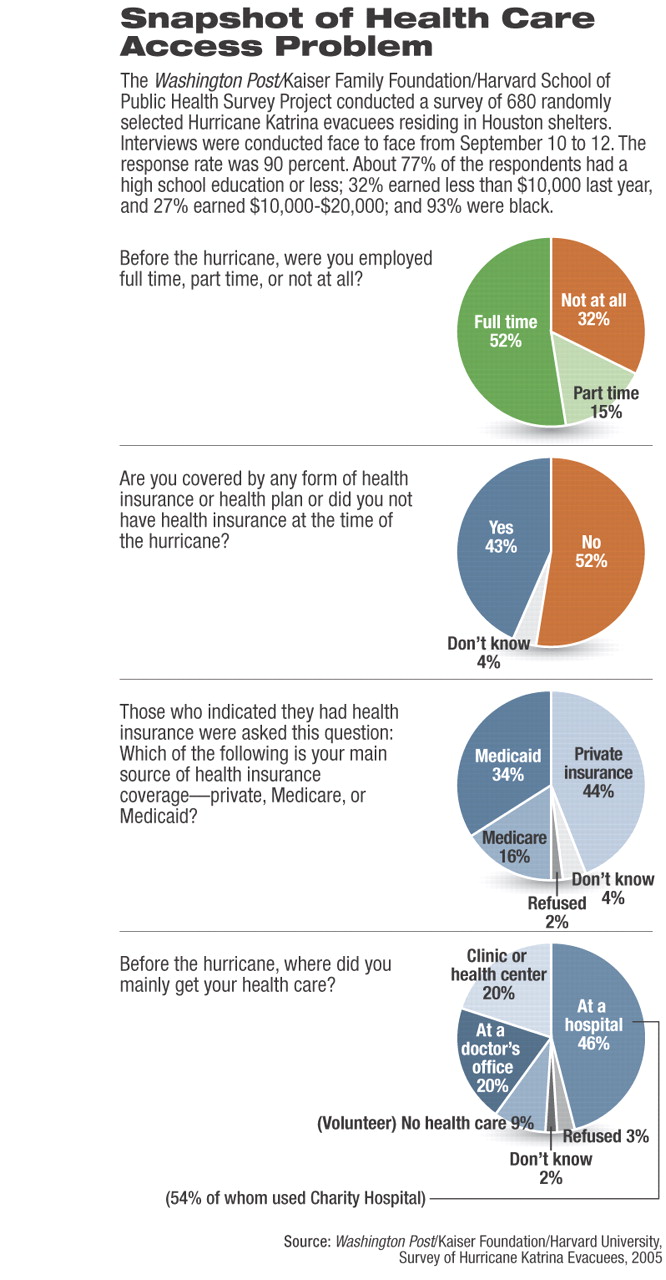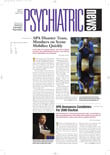At the beginning of a two-day tour of Texas shelters on September 13, Mike Leavitt, secretary of Health and Human Services, announced, “For those persons with evacuee status, we are stripping away many of the eligibility and enrollment requirements normally needed to apply for federal benefits.”
He said, in a press release dated the same day, that states would be given flexibility to enroll evacuees without requiring documents such as tax returns or proof of residency.
The Houston Chronicle reported on September 16 that Texas would be permitted to create a new Medicaid eligibility category for evacuees, which would include only those traditionally eligible for Medicaid. The federal government would pay the full costs for that group, according to the story.
Details about how this temporary program might work were scant, however. Here, for example, is a central question about the program that appeared on the official Web site of the Centers for Medicaid and Medicare (CMS) on September 18 and the answer:
Question: At what point will individuals no longer be treated as“ hurricane victims”? Is there a set period of time or does it vary by individual?
Answer: The waiver authority does not vary by individual—it applies to the geographic area in which the emergencies have been detected. In addition, the waiver authority is geared toward requirements upon providers, not individual beneficiaries. However, the effect of the waiver may vary somewhat from individual to individual, depending not upon the waiver authority itself, but rather upon whether that person has been evacuated to a facility for which requirements have been waived (as opposed to a facility to which the waiver does not apply).
Problems of definition appear simple by contrast to issues concerning money.
Senate Majority Leader William Frist, M.D. (R-Tenn.), said he is “not convinced” that an expansion of Medicaid is necessary but added that it is “likely that the federal government is going to have to step up more,” according to a report on the Web site<www.kaisernetwork.org> on September 16.
Legislation concerning Medicaid coverage for Katrina survivors has been introduced in both houses of Congress. Here are the bills, summarized from material on the Web site of the National Association of State Medicaid Directors on September 18.
•
H 3671 provides 100 percent Federal Medicaid Assistance Percentage (FMAP) to states providing medical assistance to evacuees.
•
H 3698 provides “uniform eligibility rules” that include“ no income, resources, residency, or categorical eligibility requirements.” Eligibility can be determined “after the disaster.” The bill also increases FMAP to states that provide medical assistance to evacuees and postpones the cutoff of Medicaid prescription drug coverage that is scheduled to take place January 1 for beneficiaries who are also eligible for Medicare. The bill also halts scheduled reductions of FMAP in 2006.
•
HR 3708 provides states with 10 percent of Hurricane Katrina disaster relief funds for mental health services to cover the states' share of Medicaid and the costs of the State Children's Health Insurance Program (SCHIP) for those services. The bill also provides states 10 percent of Hurricane Katrina disaster relief funds, without cost sharing, for reimbursement of mental health professionals for outpatient mental health treatment and prescription medication.
•
S 1688 provides 100 percent FMAP to states for Medicaid and SCHIP for evacuees and streamlines the application process.
•
S Amendment 1652 makes all “displaced persons” below the federal poverty level eligible for Medicaid. It also provides 100 percent FMAP for Medicaid and SCHIP in Alabama, Mississippi, and Louisiana and for displaced individuals from those states.
•
S 1637 authorizes disaster emergency Medicaid to ensure that“ low-income” evacuees from Louisiana, Mississippi, and Alabama are eligible for medical assistance in any state. It also provides a simplified application process and guarantees drug coverage for Medicare-eligible individuals. States affected by Katrina would be given temporary financing and 100 percent FMAP for services to “low-income” evacuees.
APA and more than 100 other organizations asked Congress in a letter dated September 14 to provide full financial support for emergency Medicaid and to streamline eligibility and documentation requirements (see story on page 7).
Updates about proposed legislation and other issues concerning Katrina survivors and Medicaid are available on the CMS Web site at<www.cms.hhs.gov/katrina/> and the Web site of the National Association of State Medicaid Directors at<www.nasmd.org>.▪

